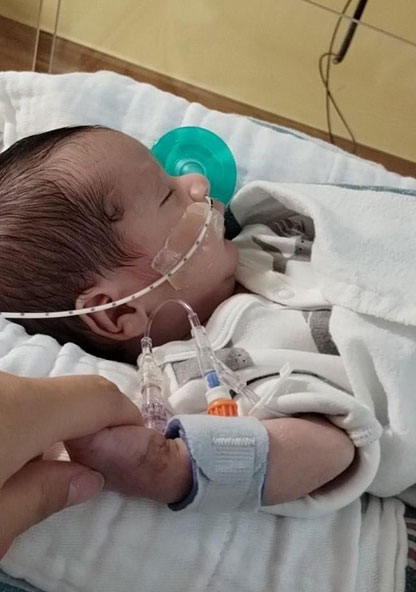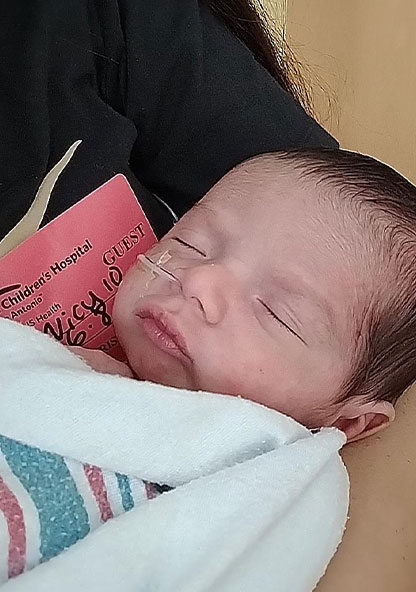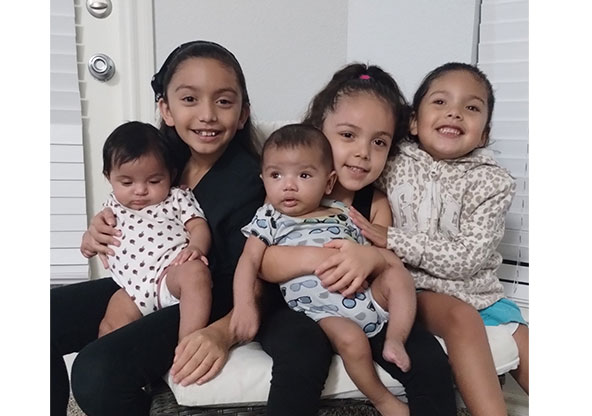Navigating Uncharted Waters: A Family's Journey with a Rare Metabolic Disorder
 In the fall of 2022, the lives of Megan and Troy Contreras took an unexpected turn during a routine pregnancy check-up when they received news that would change their family forever: Megan was expecting twins. With three daughters already a part of their family, the revelation that two more children were on the way left the couple both excited and stunned.
In the fall of 2022, the lives of Megan and Troy Contreras took an unexpected turn during a routine pregnancy check-up when they received news that would change their family forever: Megan was expecting twins. With three daughters already a part of their family, the revelation that two more children were on the way left the couple both excited and stunned.
"I think I asked the doctor at least 10 times if he was sure," Megan recalled. “We couldn’t believe it.”
Their twins turned out to be a girl and a boy, and the joy of finally having a son overshadowed the initial shock. As the weeks went by, Megan’s pregnancy continued to be healthy and uneventful. Her doctors scheduled a C-section when she was almost 37 weeks along, and on May 26, 2023, the twins were born at a CHRISTUS Santa Rosa Hospital – Westover Hills
Soon after the twins’ birth, however, their son, whom they named after his father, began showing concerning symptoms.

“His sister was completely healthy and doing great, but Troy had a hard time feeding and he was lethargic and only wanted to sleep,” Megan recalled. “They ran tests and saw he had a low fever and also that his ammonia levels were going down.”
Advanced, Specialized Care
After multiple attempts to address these symptoms, Troy’s doctors ultimately decided to transfer him to CHRISTUS Children’s so that he could be evaluated by specialists in their Level IV Neonatal Intensive Care Unit (NICU), which offers the highest level of multidisciplinary medical and surgical services for newborn and premature babies.
There, Troy was placed under the care of John (JD) Odom, MD, who specializes in clinical genetics and metabolic disorders, and Cheryl Motta, MD, medical director of the NICU. Troy was provided the best possible care while he went through countless evaluations, including genetic screenings, to determine the cause of his unique condition.
"With complex patients like Troy, it’s important for us to complete a comprehensive evaluation followed by a series of specialized tests designed to identify genetic variations, which allow us to unravel the underlying genetic factors contributing to a patient's symptoms,” Dr. Odom said. “Understanding the root cause is not only essential for accurate diagnosis but also for tailoring effective treatment plans. It empowers us to provide personalized care and potentially discover new avenues of targeted therapies, ultimately improving the overall quality of life for our patients."
A Diagnosis and Personalized Treatment
Through specialized testing, the team was able to determine a diagnosis: Troy was suffering from glutaric aciduria type II, a rare condition characterized by a deficiency or absence of an enzyme that prevents the breakdown of certain proteins and fats in the body, resulting in the accumulation of acids in the blood and urine. This condition can be serious and can lead to increased acidity in a baby’s body, which can cause weakness, poor feeding, and delayed development.
Although Megan and Troy were relieved to have a diagnosis, the fact that their son’s condition is so rare meant that there is no standard protocol for treatment. Luckily, the specialists at CHRISTUS Children’s worked together to come up with a plan. Troy’s dietitian, Jennifer Raabe, RD, created a special formula that would meet his dietary needs and help him thrive while avoiding exposure to the proteins his body is unable to break down.
"Dealing with glutaric acidemia type II is quite a challenge due to its rarity and complexity,” explained Jennifer. “Our medical team has come up with different treatments and dietary changes to help manage this condition effectively, and we created a special formula for Troy to ensure that he gets the nutrients he needs to thrive without making his condition worse."
A New Normal

Troy spent nearly a month in the NICU, but he was finally able to go home thanks to the expert care he received at CHRISTUS Children’s. Today, he is still on the special formula, which requires careful preparation—a challenge for Megan, who is also caring for Troy’s twin sister as well as their three older daughters.
“I prepare the special batch of formula every 24 hours and Troy has to take four different supplements twice daily—his survival depends on it,” Megan said. “It’s definitely been a challenge, but I’m just so thankful we have answers and a way to move forward.”
While the prospect of a long-term special diet is daunting, Megan is thankful for the ongoing guidance and optimism from the medical team at CHRISTUS Children’s. One of Troy’s providers, Alexandra Grace, CPNP-PC, a pediatric nurse practitioner, has tirelessly sought new information and potential treatments for the disorder, aiming to improve Troy’s quality of life.
“She has been so motivating and she has a lot of hope that in the future, he won’t have to be on this special diet,” Megan said.
Throughout their ordeal, the Contreras family found solace in the compassion and support of their medical team, all of whom took the time to explain every aspect of their son's condition and offered invaluable assistance in caring for him.
"Every single doctor, nurse and member of the team has been incredibly kind, supportive, and instrumental in enabling me to care for my son," Megan said. "I am so grateful for each and every one of them."
To learn more about the specialized testing and high level of care available at CHRISTUS Children’s Genetics Clinic, visit https://www.christushealth.org/get-care/services-specialties/genetics.


 In the fall of 2022, the lives of Megan and Troy Contreras took an unexpected turn during a routine pregnancy check-up when they received news that would change their family forever: Megan was expecting twins. With three daughters already a part of their family, the revelation that two more children were on the way left the couple both excited and stunned.
In the fall of 2022, the lives of Megan and Troy Contreras took an unexpected turn during a routine pregnancy check-up when they received news that would change their family forever: Megan was expecting twins. With three daughters already a part of their family, the revelation that two more children were on the way left the couple both excited and stunned.


